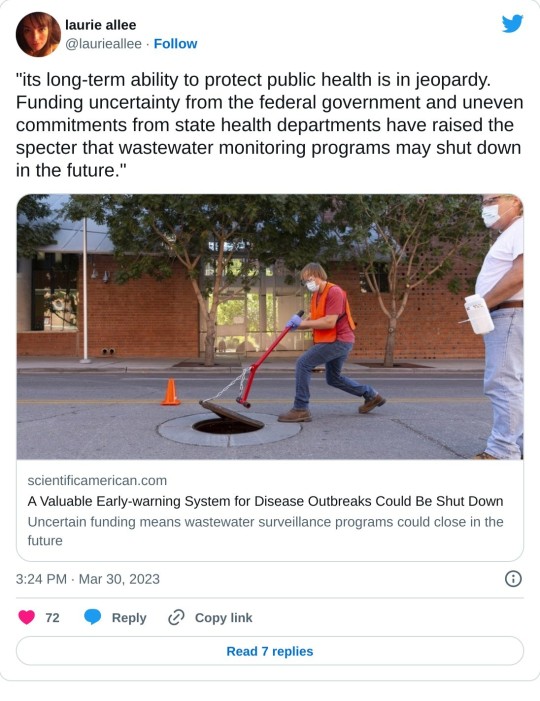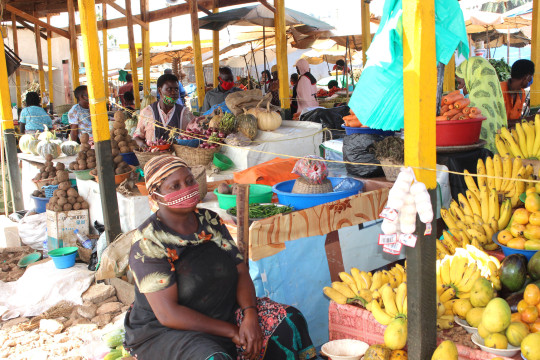#covid-19 data
Explore tagged Tumblr posts
Link
if you’re in the US and confused about the end of the public health emergency for COVID-19 next week, this post might help!
15 notes
·
View notes
Text
Pandemic 3 years later: Has the COVID-19 virus won?
On the third anniversary of the COVID-19 pandemic, the virus is still spreading and the death toll is nearing 7 million worldwide. Yet most people have resumed their normal lives, thanks to a wall of immunity built from infections and vaccines. The virus appears here to stay, along with the threat of a more dangerous version sweeping the planet. “New variants emerging anywhere threaten us…
View On WordPress
#coronavirus#coronavirus pandemic#coronavirus pandemic anniversary#Covid-19#covid-19 data#covid-19 lockdown#Covid-19 pandemic#covid-19 virus#health#health news
0 notes
Text
TRYING AGAIN WITH CLEARER WORDING. PLS READ BEFORE VOTING
*Meaning: When did you stop wearing a mask to a majority of your public activities? Wearing a mask when you feel sick or very rarely for specific events/reasons counts as “stopping”
[More Questions Here]
#poll#covid#covid 19#reblog for sample size#I could tag this post ‘environmental storytelling’ cause goddamn#if you reblogged the original please reblog this one#I just want my DATA#hey#excellent deminstration of the scientific process here#needing to correct for confusion on your participants end to get the results you want#can’t fix the tumblr sampling bias but apparently there’s anti-maskers here too#peoples life circumstance can vary so no judgement from me OP on when you stopped#unless you never masked. then I am judging you#like you didn’t even TRY?
624 notes
·
View notes
Text





Vicious August 1998
#I know!#a rare post of old visual kei stuff from me!#the context for this is that on one of my trips after COVID-19#I tried to find a substitute store for Trio2 which had shut down in Nakano Broadway#I had read that there were some magazine shops at least in Ochanomizu#I didn't have data and tried to navigate with my geolocation skills but ended up asking a sort of old officer just to be sure#he said something along the lines of 'but I'm just an old man...'#so a younger man came to his and my rescue and offered to help me#he understood little English and used Google Translate to communicate with me for the most#turned out he was a magazine enthusiast himself and he took me to a couple of stores#they all had only antique magazines like nothing past 2005#he found everything that had Dir en grey at each of those stores#I felt bad after a while because it was not at all what I was looking for#so I ended up buying the Xth magazine that he showed me#see above hah#just so you know I was really close to the store just with my skills#Dir en grey#young#scans#magazine#visual kei#vkei#Kyo#Kaoru#Die#Shinya#Toshiya#makeup#I'm not sure why I'm such a fan of that middle finger nail paint
511 notes
·
View notes
Text

We tried to tell you that those COVID tests couldn’t tell the difference between the flu and covid. Did you listen? Most people didn’t. They bought into the fear.
Where did the flu go? Covid diagnoses from a faulty swab that was never intended for use BY ITS MAKER, who said the test was too unreliable. Why was the test quietly removed by the corrupt FDA? It was too unreliable. Why is it still the Gold Standard for covid diagnoses? Your healthcare provider is a salesman and not a healthcare provider, and we have lost common sense.
Friends of mine threw common sense out the car window and watched it get hit like a plinko disc before being trucked. Those are well-educated people who got sucked into the fear. Some are waking up to the madness. Most got at least one bioweapon shot.
It’s scary to look back and realize what happened, especially if you got tagged. That shit doesn’t just wipe off. You can make it better, but you also can’t make it go away.
So what becomes of the syndicate who brought his on?
Everything will be exposed.
How much happens now depends on how aggressive RFKjr attacks Big Pharma, and he seems like a pit bull waiting for the fight.
52 notes
·
View notes
Text
A rapid test importer landed an estimated $2 billion in federal contracts in 2021 and 2022, despite giving regulators incomplete data about its product’s accuracy, Global News has found. A year-long investigation into federal procurement revealed that BTNX, a small rapid test supplier based outside Toronto, deleted dozens of specimens, or samples, from a study it submitted to Health Canada. That evaluation showed how well the company’s test detected COVID-19. The deletions made BTNX’s test appear more reliable and sensitive than it really was, according to researchers Global News consulted. The device could detect the virus in users who were the most contagious, but results from leading regulators’ evaluation programs indicate BTNX’s test was much less dependable in all other cases.
Continue Reading
Tagging @politicsofcanada
135 notes
·
View notes
Text

Orange County Florida showing highest rates of covid in wastewater since monitoring began and rising. This is higher than their omicron peak. "The pandemic is over."
#covid#mask up#pandemic#covid 19#data report#coronavirus#wear a mask#sars cov 2#still coviding#public health#wear a respirator#covid news#covidー19#covid conscious#covid is airborne#covid isn't over#covid pandemic#the pandemic isn't over
20 notes
·
View notes
Photo

Biobot’s interactive tracker is no longer available:
(From Raw Data to Actionable Insights: Biobot’s Evolution of Public Data Sharing | Biobot Analytics)
Blog update 5/30/24:
We want to thank the public for all the love and support of this work over the years.
After more than three years of making COVID-19 wastewater data available to the public, Biobot has reduced its public data reporting efforts. As we expand our wastewater epidemiology technologies to other population health areas, we no longer have the resources to maintain our COVID-19 dashboard. We decided to sunset the dashboard now because of other publicly available sources of wastewater data, including at the local level through our customers and partners and nationwide through the CDC NWSS program. We are optimistic that government sharing of wastewater data will continue to improve.
This does not mean we believe COVID-19 is no longer a threat, nor are we stopping our work. We see great potential for wastewater to positively impact public health efforts and the healthcare ecosystem in many areas beyond COVID-19. We remain committed to leading in this space and pioneering new applications for wastewater epidemiology.
Wastewater data resources can be found at:
You can find our risk reports here
You can find CDC’s COVID tracker here
Check your local and state public health departments and wastewater treatment facilities as they may be sharing this information directly
Epidemiologists doing important data reporting for the public:
Your Local Epidemiologist, Katelyn Jetelina
Force of Infection, Caitlin Rivers
Helen Branswell, STAT News
17 notes
·
View notes
Text
If you live in the US (and probably many other places), covid is surging

act accordingly
#covid#another mask ban was just passed - this time in nassau county in NY#wear a mask#your cold might just be a cold....but there's a good chance it's not#every week I check wastewater data and feel fucking insane#covid-19#and even if you dont care about your own health - you should care about other people's
9 notes
·
View notes
Text

#us politics#news#twitter#tweet#2024#death rates#coronavirus#covid#covid 19#coronavirus vaccine#covid vaccine#graphs#data#data visualization#the serfs#x
14 notes
·
View notes
Link
I feel like it’s been a while since I’ve talked about my work stuff here, so... have a post I wrote for my COVID-19 newsletter and blog today
14 notes
·
View notes
Text



The numbers for the week of 8-29-24.
5 notes
·
View notes
Text
*Meaning: When did you stop wearing a mask to a majority of your public activities? Wearing a mask when you feel sick or very rarely for specific events/reasons counts as “stopping”
*Edit: This post is about COVID not Autism*
Edit 2: Please vote in updated poll Here with clearer wording, thank you!
#covid#covid 19#masking#poll#broad categories cause I’m just interested in the data#and I just want a Vibe#reblog for sample size
314 notes
·
View notes
Text
Waste Water Data could end

A concerning development for a vital source of data when home tests cannot be reported beyond an NIH website (results are not publicly accessible or posted), recorded PCRs do not represent all cases, and a lack of contact tracing throughout the ongoing pandemic. It is urgent to press political and health officials to continue funding, make https://www.makemytestcount.org results public on their site and stress the importance of such monitoring for covid, other illness and a vital part of the early detection and tools for future outbreaks and pandemics.
If waste water monitoring is lost it will impact any kind of People's CDC weekly reports which is relied on by at least 31,000 people nationwide.
https://www.peoplescdc.org
https://linktr.ee/peoplescdc
70 notes
·
View notes
Text
Researchers study differences in attitudes toward Covid-19 vaccines between women and men in Africa
New Post has been published on https://thedigitalinsider.com/researchers-study-differences-in-attitudes-toward-covid-19-vaccines-between-women-and-men-in-africa/
Researchers study differences in attitudes toward Covid-19 vaccines between women and men in Africa


While many studies over the past several years have examined people’s access to and attitudes toward Covid-19 vaccines, few studies in sub-Saharan Africa have looked at whether there were differences in vaccination rates and intention between men and women. In a new study appearing in the journal Frontiers in Global Women’s Health, researchers found that while women and men self-reported similar Covid-19 vaccination rates in 2022, unvaccinated men expressed more intention to get vaccinated than unvaccinated women.
Women tend to have better health-seeking behaviors than men overall. However, most studies relating to Covid-19 vaccination have found that intention has been lower among women. “We wondered whether this would hold true at the uptake level,” says Rawlance Ndejjo, a leader of the new study and an assistant lecturer in the Department of Disease Control and Environmental Health at Makerere University.
The comparable vaccination rates between men and women in the study is “a good thing to see,” adds Lula Chen, research director at MIT Governance Lab (GOV/LAB) and a co-author of the new study. “There wasn’t anything gendered about how [the vaccine] was being advertised or who was actually getting access to it.”
Women’s lower intention to vaccinate seemed to be driven by concerns about vaccine safety, suggesting that providing factual information about vaccine safety from trusted sources, like the Ministry of Health, could increase uptake.
The work is a collaboration between scholars from the MIT GOV/LAB, Makerere University’s School of Public Health in Uganda, University of Kinshasa’s School of Public Health in the Democratic Republic of the Congo (DRC), University of Ibadan’s College of Medicine in Nigeria, and Cheikh Anta Diop University in Senegal.
Studying vaccine availability and uptake in sub-Saharan Africa
The authors’ collaboration began in 2021 with research into Covid-19 vaccination rates, people’s willingness to get vaccinated, and how people’s trust in different authorities shaped attitudes toward vaccines in Uganda, the DRC, Senegal, and Nigeria. A survey in Uganda found that people who received information about Covid-19 from health workers were more likely to be vaccinated, stressing the important role people who work in the health-care system can play in vaccination efforts.
Work from other scientists has found that women were less likely to accept Covid-19 vaccines than men, and that in low- and middle-income countries, women also may be less likely to get vaccinated against Covid-19 and less likely to intend to get vaccinated, possibly due to factors including lower levels of education, work obligations, and domestic care obligations.
Previous studies in sub-Saharan Africa that focused on differences between men and women with intention and willingness to vaccinate were inconclusive, Ndejjo says. “You would hardly find actual studies on uptake of the vaccines,” he adds. For the new paper, the researchers aimed to dig into uptake.
People who trust the government and health officials were more likely to get vaccinated
The researchers relied on phone survey data collected from adults in the four countries between March and July 2022. The surveys asked people about whether they’d been vaccinated and whether those who were unvaccinated intended to get vaccinated, as well as their attitudes toward Covid-19, their trust in different authorities, demographic information, and more.
Overall, 48.5 percent of men said they had been vaccinated, compared to 47.9 percent of women. Trust in authorities seemed to play a role in people’s decision to vaccinate — receiving information from health workers about Covid-19 and higher trust in the Ministry of Health were both correlated with getting vaccinated for men, whereas higher trust in the government was correlated with vaccine uptake in women.
Lower interest in vaccines among women seemed related to safety concerns
A smaller percentage of unvaccinated women (54 percent) said they intended to get vaccinated, compared to 63.4 percent of men. More unvaccinated women said they had concerns about the vaccine’s safety than unvaccinated men, which could be driving their lower intention.
The researchers also found that unvaccinated women and men over 40 had similar levels of intention to get vaccinated — lower intention in women under 40 may have driven the difference between men and women. Younger women could have concerns about vaccines related to pregnancy, Chen says. If this is the case, the research suggests that officials need to provide additional reassurance to pregnant people about vaccine safety, she adds.
Trust in authorities also contributed to people’s intention to vaccinate. Trust in the Ministry of Health was tied to higher intention to vaccinate for both men and women. Men with more trust in the World Health Organization were also more likely to intend to vaccinate.
“There’s a need to deal with a lot of the myths and misconceptions that exist,” Ndejjo says, as well as ensure that people’s concerns related to vaccine safety and effectiveness are addressed. Officials need “to work with trusted sources of information to bridge some of the gaps that we observe,” he adds. People need to be supported in their decision-making so they can make the best decisions for their health.
“This research highlights linkages between citizen trust in government, their willingness to get vaccines, and, importantly, the differences between men and women on this issue — differences that policymakers will need to understand in order to design more targeted, gender-specific public health interventions,” says study co-author Lily L. Tsai, who is MIT GOV/LAB’s director and founder and the Ford Professor of Political Science at MIT.
This project was funded by the Bill & Melinda Gates Foundation.
#2022#Africa#amp#author#bridge#Collaboration#college#covid#covid 19#data#deal#democratic#Design#Difference Between#Disease#driving#education#Environmental#Ford#Foundation#Gender#Global#governance#Government#Health#Health sciences and technology#how#it#LESS#Medicine
2 notes
·
View notes
Text

COVID-19 cases are growing or likely growing in 39 states in US, and they don't appear to be declining in any state, according to the latest Centers for Disease Control and Prevention (CDC) data.
https://www.axios.com/2024/06/27/covid-summer-surge
CDC Covid Data Tracker:
https://covid.cdc.gov/covid-data-tracker/#wastewater-surveillance
2 notes
·
View notes